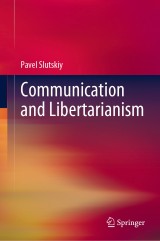Details

Communication and Libertarianism
|
CHF 153.50 |
|
| Verlag: | Springer |
| Format: | |
| Veröffentl.: | 02.08.2021 |
| ISBN/EAN: | 9789813366640 |
| Sprache: | englisch |
Dieses eBook enthält ein Wasserzeichen.
Beschreibungen
<div>"This is an outstanding contribution to both libertarian political philosophy and communication theory. It is far and away the most comprehensive work on communication issues in libertarian theory ever published. The author has integrated successfully the libertarian insights of Mises, Rothbard, Block, Kinsella and others with the philosophy of language as developed by Austin, Searle and Grice. He has done so in a unique and unprecedented way. The book would appeal to students and scholars interested in libertarian theory and more generally, to philosophers and political scientists interested in high-level scholarship.”</div><div><br></div><div> - David Gordon, libertarian philosopher and intellectual historian, Ludwig von Mises Institute.</div><div> </div><div><br></div><p></p>
<div><p>1) Introduction.- 2) Methodological foundations of communication studies: communication art vs. communication science.- 3) Communication as a subcategory of human action: praxeological approach to communication and the object of communication science.- 4) Communication freedom and ethical theory: the logic of non-aggression and communication of consent.- 5) Communication theory of property rights and homesteading.- 6) The role of communication in adaptation of moral norms.- 7) Communication freedom and property rights.- 8) The freedom to communicate as a liberal value.- 9) Communication acts and initiation of aggression: causality and responsibility.- 10) Communication freedom of individuals and the “interests of society”.- 11) Praxeological objection to intellectual property rights laws.- 12) When words become deeds: mere speech and speech acts in the theory of contract: the cases of business communication.- 13) Communication freedom, libel, defamation and reputation.- 14) Communication freedom, privacy and “the right to know”.- 15) Information for sale: access to data and blackmail.- 16) Conclusion.</p></div>
<p>Pavel Slutskiy is an associate professor in Public Relations. He was born in Saint-Petersburg, Russia, where he earned his PhD in Political Science from Saint-Petersburg State University. Since 2014, he has worked in the Faculty of Communication Arts at Chulalongkorn University, Thailand. His research interests include political philosophy, communication theory, cross-cultural communication and public relations. He is the author and co-author of three monographs, three university textbooks and numerous articles which were published in American Behavioral Scientist, Libertarian Papers, Journal of Promotional Communications and Quarterly Review of Business Disciplines among others. He is also a communication practitioner with more than 20 years of experience in PR, corporate communications, journalism and social media. </p><p> </p><p><br></p><br>
<div>"This is an outstanding contribution to both libertarian political philosophy and communication theory. It is far and away the most comprehensive work on communication issues in libertarian theory ever published. The author has integrated successfully the libertarian insights of Mises, Rothbard, Block, Kinsella and others with the philosophy of language as developed by Austin, Searle and Grice. He has done so in a unique and unprecedented way. The book would appeal to students and scholars interested in libertarian theory and more generally, to philosophers and political scientists interested in high-level scholarship.”</div><div><br></div><div> - David Gordon, libertarian philosopher and intellectual historian, Ludwig von Mises Institute.</div><div><br></div><p></p>
<p>The first book to approach communication from the methodological positions of rationalism and praxeology</p><p>Redefines the concept of communication, as well as the object, the scope and the role of communication studies</p><p>Explores the relationship between libertarianism and communication using the speech act theory</p><p>Argues that the key postulates of libertarianism - property rights and consent - are logically dependent on communication</p><p>Proposes a normative theory of communication based on libertarian political philosophy</p>
This book presents a comprehensive foundation for legal and political theory of communication, based on fundamental ethical propositions and an understanding of the nature of communicative actions. The questions that the book endeavours to address are particularly important within the context of increasing government interest in communication and ongoing attempts at intervention and regulation of the communication sphere, particularly the Internet. Further understanding of ethical foundations as well as a theoretical framework for the application of political power to communication is required to enable a proper scientific evaluation and justification of various actions and initiatives. The methodology underpinning this work is based on the praxeological approach so as to deduce analytical conclusions a priori theoretical truths. Praxeology rests on the fundamental axiom that individual human beings act, that is, on the primordial fact that individuals engage in conscious actions toward chosen goals. In this book, the principles of praxeology are applied to examining communication phenomena, organising the logic of the process in the framework of ends (purposes) and means (things utilised toward purposes). This book will be of interest to communication theorists, political science scholars and philosophers with a particular interest in libertarianism.<p></p>
Diese Produkte könnten Sie auch interessieren:

Communicating Science in Social Contexts

von: Donghong Cheng, Michel Claessens, Nicholas R. J. Gascoigne, Jenni Metcalfe, Bernard Schiele, Shunke Shi

CHF 177.00















